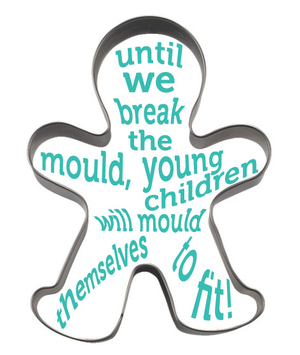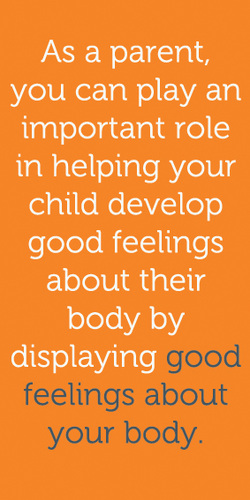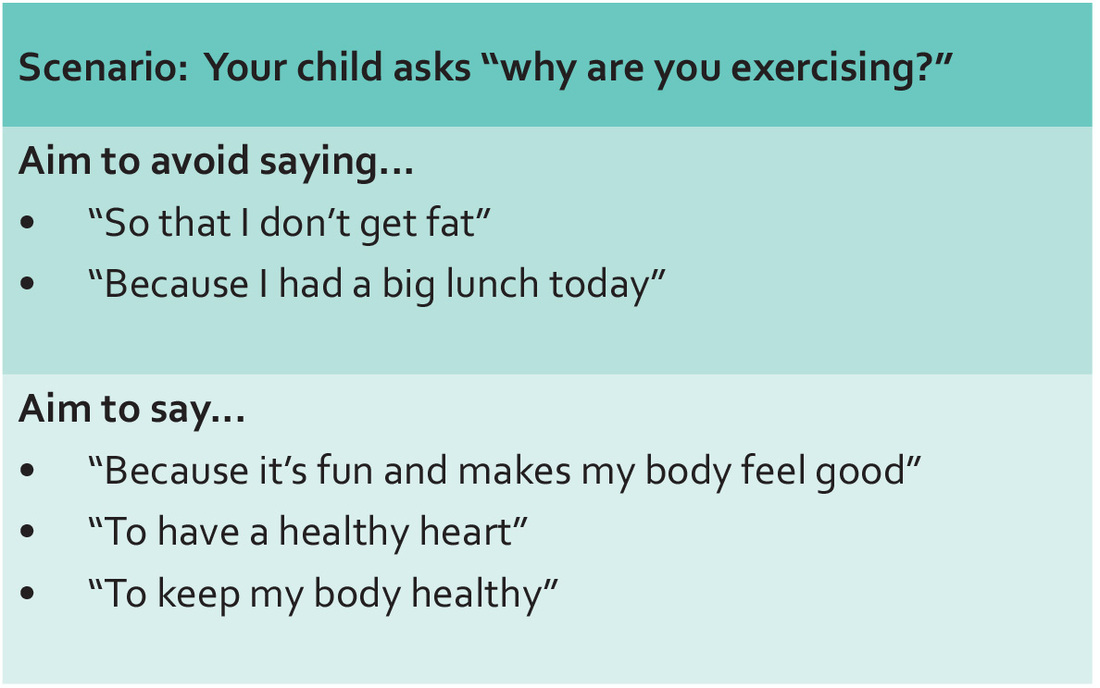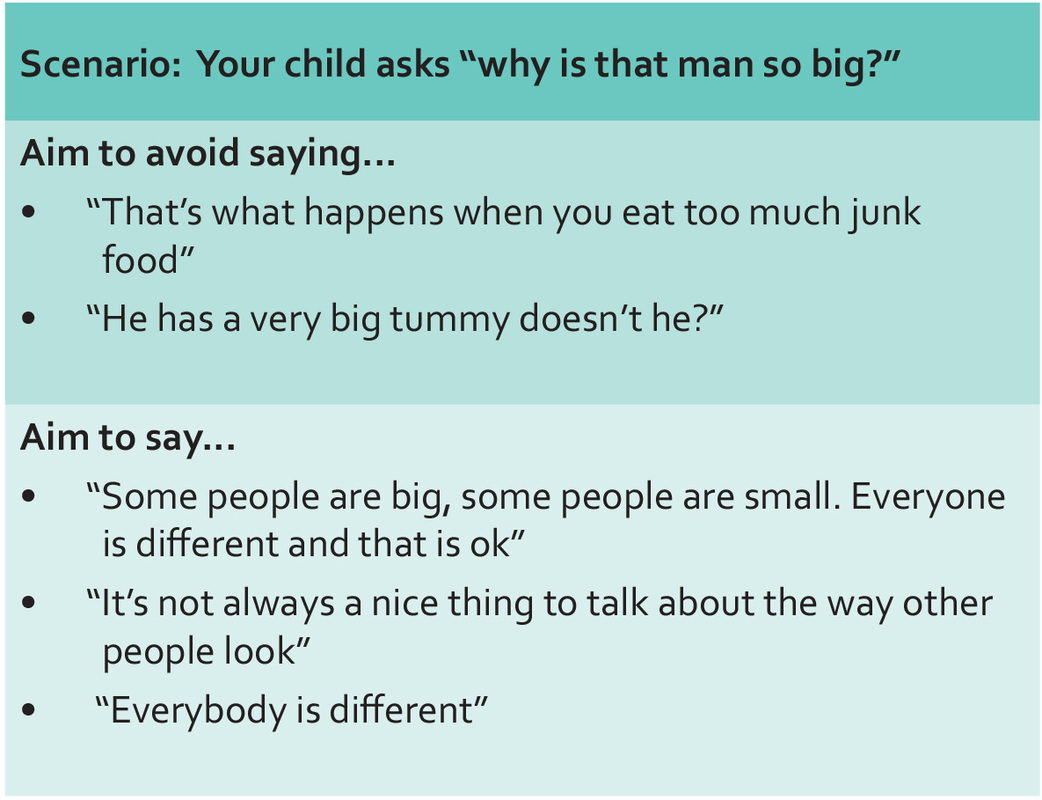why is my body image important for my child?
_ _ _ _ _ _ _ _ _ _ _ _ _ _ _ _ _ _ _ _ _ _ _ _ _ _ _ _ _ _ _ _ _ _ _ _ _ _ _ _ _ _ _ _ _ _ _ _ _
|
Video 1: how the language you use can influence your child's body image
|
|
_ _ _ _ _ _ _ _ _ _ _ _ _ _ _ _ _ _ _ _ _ _ _ _ _ _ _ _ _ _ _ _ _ _ _ _ _ _ _ _ _ _ _ _ _ _ _ _
Tips for parents
_ _ _ _ _ _ _ _ _ _ _ _ _ _ _ _ _ _ _ _ _ _ _ _ _ _ _ _ _ _ _ _ _ _ _ _ _ _ _ _ _ _ _ _ _ _ _ _
assess your own body attitudes and feelings
• We all have our own attitudes and beliefs about appearance, weight, and shape - about both our own and others’ bodies. It’s
important to think about how your attitudes and beliefs may influence the way your child sees their own body.
• It can be hard to be positive all the time about the way you look. But try not to criticise your appearance (e.g., “I’m so fat”)
as this may encourage your child to be critical of their appearance. Instead, if you want to talk about your appearance when
your child is around, try to be positive and praising. This may be as simple as finding one aspect of your body you like, or find
useful, and mentioning it in front of your child.
• Praise yourself in areas NOT related to appearance in front of your child, so your child learns that there are many ways to be
valued.
• Make your home a place where bodies are appreciated for what they can do, not just how they look. If others start talking
negatively, try to discourage these comments and make negative comments about weight and shape unacceptable in your
home.
• Try not to greet others with comments about their appearance and consider other topics to talk about rather than how
someone looks.
important to think about how your attitudes and beliefs may influence the way your child sees their own body.
• It can be hard to be positive all the time about the way you look. But try not to criticise your appearance (e.g., “I’m so fat”)
as this may encourage your child to be critical of their appearance. Instead, if you want to talk about your appearance when
your child is around, try to be positive and praising. This may be as simple as finding one aspect of your body you like, or find
useful, and mentioning it in front of your child.
• Praise yourself in areas NOT related to appearance in front of your child, so your child learns that there are many ways to be
valued.
• Make your home a place where bodies are appreciated for what they can do, not just how they look. If others start talking
negatively, try to discourage these comments and make negative comments about weight and shape unacceptable in your
home.
• Try not to greet others with comments about their appearance and consider other topics to talk about rather than how
someone looks.
show acceptance of body differences
• Teach your child that everyone deserves to be treated with respect, regardless of their body shape or size. You may do this by
treating all people with respect, regardless of their appearance.
See Activity 2
• Show acceptance of diversity in different body shapes and sizes, by not being critical of others’ appearance.
• Try to avoid endorsing unrealistic body shapes. For example, don’t only comment on the attractiveness of very slim women or
lean, muscular men. Otherwise your child may learn that the only way to be attractive is to achieve this unrealistic body ideal.
• Don’t suggest to your child that a person can’t do particular things because they look a certain way or weigh a particular
amount. For example, don’t suggest that a woman is “too large to wear those jeans”.
• Promote the importance of an active and healthy body rather than a thin or lean body.
See Fact Sheet 1 and Healthy Body Weight section
• Encourage your child to equate a person’s worth with personal qualities (e.g., kindness to others), rather than appearance.
• Praise others for qualities other than their appearance, in front of your child.
treating all people with respect, regardless of their appearance.
See Activity 2
• Show acceptance of diversity in different body shapes and sizes, by not being critical of others’ appearance.
• Try to avoid endorsing unrealistic body shapes. For example, don’t only comment on the attractiveness of very slim women or
lean, muscular men. Otherwise your child may learn that the only way to be attractive is to achieve this unrealistic body ideal.
• Don’t suggest to your child that a person can’t do particular things because they look a certain way or weigh a particular
amount. For example, don’t suggest that a woman is “too large to wear those jeans”.
• Promote the importance of an active and healthy body rather than a thin or lean body.
See Fact Sheet 1 and Healthy Body Weight section
• Encourage your child to equate a person’s worth with personal qualities (e.g., kindness to others), rather than appearance.
• Praise others for qualities other than their appearance, in front of your child.






